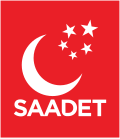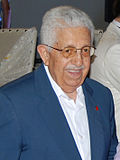This article has multiple issues. Please help improve it or discuss these issues on the talk page . (Learn how and when to remove these messages)
|
Felicity Party Saadet Partisi | |
|---|---|
 | |
| Abbreviation | SAADET (official) SP (unofficial) |
| Leader | Mahmut Arıkan |
| General Secretary | Mesut Doğan |
| Spokesperson | Birol Aydın |
| Founder | Necmettin Erbakan Recai Kutan |
| Founded | 20 July 2001 |
| Split from | Virtue Party |
| Headquarters | Ziyabey Cad. 2. Sk. No: 15, Altındağ, Ankara, Turkey |
| Newspaper | Millî Gazete |
| Youth wing | Genç Saadet |
| Women's wing | Saadet Kadın Kolları |
| Membership (2025) | |
| Ideology | Conservatism [5] Religious conservatism [6] Religious nationalism [9] Millî Görüş [10] Islamism [15] |
| Political position | Right-wing [16] |
| National affiliation | Nation Alliance (2018–2023) Felicity and Future Alliance (2023–2025) New Path (2025–present) |
| Colours | Red (official) Hot pink (customary) |
| Grand National Assembly | 1 / 600 |
| District municipalities | 1 / 922 |
| Belde Municipalities | 3 / 388 |
| Municipal Assemblies | 72 / 20,952 |
| Party flag | |
 | |
| Website | |
| saadet | |
The Felicity Party (Turkish : Saadet Partisi, SAADET) is an Islamist Turkish political party. It was founded in 2001, and is mainly supported by conservative Muslims in Turkey.
Contents
- History
- National Alliance
- Nation Alliance
- Since 2023
- Political positions
- Party leaders
- Election results
- Parliamentary elections
- See also
- Notes
- References
- External links
It was founded on 20 July 2001 after the Virtue Party (FP) was banned by the Constitutional Court. While the party's reformist wing formed the Justice and Development Party (AKP), the hardliners founded the Felicity Party. Although an Islamist party, its policy platform covers the whole span of political issues in Turkey.
The Felicity Party's vote has been weakened by the success of the moderately Islamist AKP government. It has repeatedly condemned the Turkish government's aspiration to join the European Union, and relationship with Israel and the United States. It has argued that Turkey must adapt its military and foreign policy stance to meet what it argues are increasing threats coming from the West to all Islamic countries. The Party's platform is based on Necmettin Erbakan's ideas and philosophy, known as Millî Görüş.






